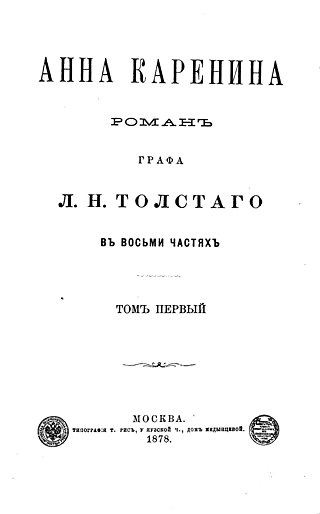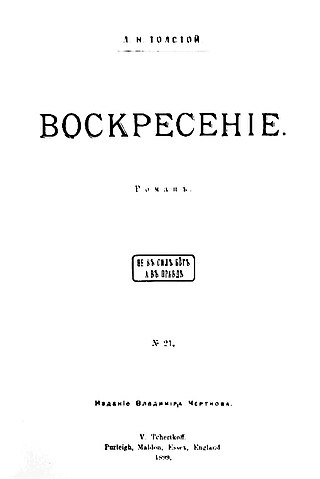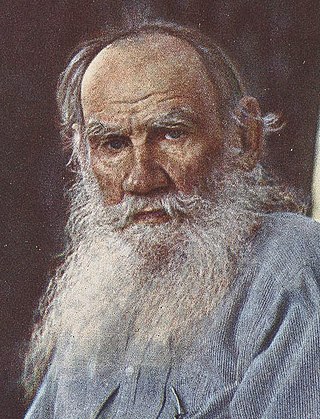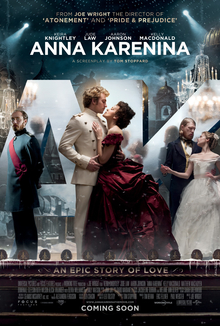
Anna Karenina is a novel by the Russian author Leo Tolstoy, first published in book form in 1878. Considered to be among the greatest works of literature ever written, Tolstoy himself called it his first true novel. It was initially released in serial installments from 1875 to 1877, all but the last part appearing in the periodical The Russian Messenger. By the time he was finishing up the last installments Tolstoy was in an anguished state of mind and, having come to hate it, finished it unwillingly. When William Faulkner was asked to list what he thought were the three greatest novels, he replied: "Anna Karenina, Anna Karenina, and Anna Karenina".
This article contains information about the literary events and publications of 1877.

Resurrection, first published in 1899, was the last novel written by Leo Tolstoy. The book is the final of his major long fiction works published in his lifetime. Tolstoy intended the novel as a panoramic view of Russia at the end of the 19th century from the highest to the lowest levels of society and as an exposition of the injustice of man-made laws and the hypocrisy of the institutionalized church. The novel also explores the economic philosophy of Georgism, of which Tolstoy had become a very strong advocate towards the end of his life, and explains the theory in detail. The publication of Resurrection led to Tolstoy's excommunication by the Holy Synod from the Russian Orthodox Church in 1901.
The Anna Karenina principle states that a deficiency in any one of a number of factors dooms an endeavor to failure. Consequently, a successful endeavor is one for which every possible deficiency has been avoided.

Science fiction is an important genre of modern Japanese literature that has strongly influenced aspects of contemporary Japanese pop culture, including anime, manga, video games, tokusatsu, and cinema.
Richard Pevear and Larissa Volokhonsky are literary translators best known for their collaborative English translations of classic Russian literature. Individually, Pevear has also translated into English works from French, Italian, and Greek. The couple's collaborative translations have been nominated three times and twice won the PEN/Book-of-the-Month Club Translation Prize. Their translation of Dostoevsky's The Idiot also won the first Efim Etkind Translation Prize.

Anna Karenina is a 1992 musical with a book and lyrics by Peter Kellogg and music by Daniel Levine.
This is a list of adaptations of Anna Karenina, the 1877 novel by Leo Tolstoy.

Anna Karenina is a 1997 American period drama film written and directed by Bernard Rose and starring Sophie Marceau, Sean Bean, Alfred Molina, Mia Kirshner and James Fox. Based on the 1878 novel of the same name by Leo Tolstoy, the film is about a young and beautiful married woman who meets a handsome count, with whom she falls in love. Eventually, the conflict between her passionate desires and painful social realities leads to depression and despair.

Count Lev Nikolayevich Tolstoy, usually referred to in English as Leo Tolstoy, was a Russian writer. He is regarded as one of the greatest and most influential authors of all time. He received nominations for the Nobel Prize in Literature every year from 1902 to 1906 and for the Nobel Peace Prize in 1901, 1902, and 1909.

Elif Batuman is an American author, academic, and journalist. She is the author of three books: a memoir, The Possessed, and the novels The Idiot, which was a finalist for the 2018 Pulitzer Prize for Fiction, and Either/Or. Batuman is a staff writer for The New Yorker.
Anna Karenina is an opera in two acts by American composer David Carlson, based on the 1877 novel Anna Karenina by Leo Tolstoy, commissioned by Florida Grand Opera to celebrate the 2007 opening of the Ziff Ballet Opera House at the Adrienne Arsht Center for the Performing Arts, co-commissioned by Opera Theatre of Saint Louis. The libretto is by British director Colin Graham, originally contemplated for Benjamin Britten's opera commissioned by the Bolshoi Theatre. Graham was to have directed the original production; after his death only weeks before the opera's opening night, the direction was taken over by Mark Streshinsky. The opera is in two acts with a prologue and an epilogue, lasting just over two hours.
A mash-up novel is an unauthorised non-canonical work of fiction, often parodical, which combines a well-known pre-existing literature text with another genre. The term was popularized in reference to horror writer Seth Grahame-Smith and his work on the classical novels of Jane Austen.
Anna Karenina is an opera in three acts by Scottish composer Iain Hamilton. The libretto, based on Leo Tolstoy's 1877 novel, Anna Karenina was written by the composer. Anna Karenina was premiered on May 7, 1981, at the London Coliseum by the English National Opera in a performance conducted by Howard Williams with Lois McDonall in the title role. The director was Colin Graham and the designers were Ralph Koltai and Annena Stubbs. Its running time is approximately two and a quarter hours.

Anna Karenina is a 2012 historical romantic drama film directed by Joe Wright. Adapted by Tom Stoppard from Leo Tolstoy's 1878 novel, the film depicts the tragedy of Russian aristocrat and socialite Anna Karenina, wife of senior statesman Alexei Karenin, and her affair with the affluent cavalry officer Count Vronsky. Keira Knightley stars as the titular character; this is her third collaboration with director Joe Wright following Pride & Prejudice (2005) and Atonement (2007). Jude Law and Aaron Taylor-Johnson appear as Karenin and Vronsky, respectively. Matthew Macfadyen, Kelly Macdonald, Domhnall Gleeson, and Alicia Vikander appear in key supporting roles.

Anna Karenina: Vronsky's Story is a 2017 Russian drama film directed by Karen Shakhnazarov. An expanded eight-part version titled Anna Karenina aired on the Russia-1 television channel.
"Sojourn" is the eighth episode of the eighth season of the anthology television series American Horror Story. It aired on October 31, 2018, on the cable network FX. The episode was written by Josh Green, and directed by Bradley Buecker.
"Apocalypse Then" is the tenth and final episode of the eighth season of the anthology television series American Horror Story. It aired on November 14, 2018, on the cable network FX. The episode was written by Ryan Murphy & Brad Falchuk, and directed by Bradley Buecker.

"Treehouse of Horror XXXIII" is the sixth episode of the thirty-fourth season of the American animated television series The Simpsons, and the 734th episode overall. It aired in the United States on Fox on October 30, 2022. The episode was directed by Rob Oliver, and written by Carolyn Omine, Ryan Koh and Matt Selman. This is the first Treehouse of Horror episode to not have an opening sequence, and instead just opens on a book of the episode before going straight into the first segment. This is also the first Treehouse of Horror since season 14's to feature a different writer for each segment. This is the first Treehouse of Horror to air closest to Halloween since 2011 without going into November.










